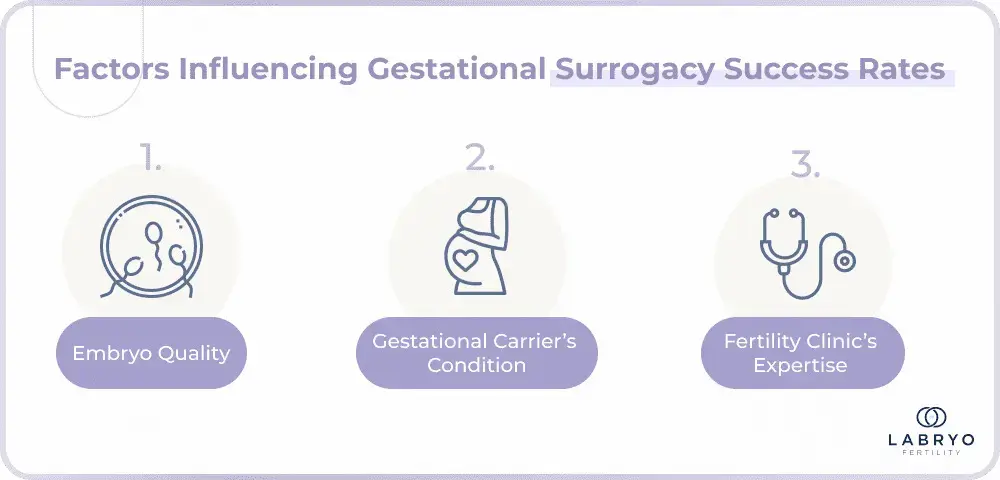Blogs
- Home
- Blogs
- Educational
- Gestational Surrogacy Success Rates

Gestational Surrogacy Success Rates
October 2, 2024Molly Chu Chen - Labryo Fertility
EducationalThis article will provide a comprehensive overview of gestational surrogacy success rates and discuss the various factors that can influence the outcome of a surrogacy arrangement, helping individuals to make informed decisions about surrogacy and their journey to parenthood.
1. What is the Success Rate of Surrogacy?
Before looking at the success rates, let us outline some basic information about surrogacy. Surrogacy is a reproductive arrangement where a woman, known as a gestational carrier or surrogate, carries and gives birth to a baby for another individual or family.
The Centers for Disease Control and Prevention (CDC) reports that over 3.5 million (2.3%) babies are born through assisted reproductive technology (ART) annually in the United States. Among these ART cycles, around 5% of embryo transfers use gestational surrogacy, which is a significant increase from the past decade, as only 2.2% of embryo transfers involved surrogacy in 2011. These statistics reflect the growing popularity of surrogacy as a viable option for those seeking to build a family.
Consequently, a successful surrogacy cycle refers to one that results in the live birth of a healthy baby. With this in mind, here are the success rates of surrogacy:
1.1 Gestational Surrogacy Success Rates
In modern surrogacy (gestational surrogacy), the process typically involves in vitro fertilization (IVF) to create an embryo with the intended parent's or donor’s sperm and eggs, which is then transferred to the surrogate's uterus.
According to the CDC, the average success rate of gestational surrogacy in the United States is approximately 75%. Once the gestational carrier is pregnant, the success rate can increase up to 95%.
It is also worth noting that although IVF using donor eggs usually has a 52% success rate, national data shows that gestational surrogacy with donor eggs tends to have improved outcomes.
Nonetheless, it is important to note that the figures above are merely general statistics and success rates can vary significantly depending on individual circumstances.
1.2. Traditional Surrogacy Success Rates
In traditional surrogacy, the surrogate uses her own egg instead of the intended mother’s or donor’s egg. The conception typically occurs through intrauterine insemination (IUI), where sperm from the intended father is introduced directly into the surrogate's uterus. This makes the surrogate the genetic mother of the child, unlike gestational surrogacy, where the surrogate and child share no genetic link.
The genetic connection between the surrogate and the child can lead to ethical and legal issues regarding parental rights. This is why traditional surrogacy is far less common, with most surrogacy agencies and clinics prioritizing gestational surrogacy.
Due to these complexities and the limited practice of traditional surrogacy, reliable success rate data is unavailable. Therefore, the remainder of this article will focus solely on information about gestational surrogacy.
2. Breaking Down Gestational Surrogacy Success Rates
In this section, we will delve deeper into the success rates of gestational surrogacy embryo transfer associated with using the patient's own eggs compared to using donor eggs, as seen in the CDC Database.
2.1. Gestational Surrogacy Success Rates with the Patient’s Own Eggs
The age of the woman can also impact the success rate. Since egg quality declines with age, the success rate of the surrogacy would depend on whose eggs are being used. Therefore, the younger the women, the higher the success rate.
| Age Group | <35 | 35 - 37 | 38 - 40 | 41 - 42 | > 42 |
| Cumulative Outcome of Live Births per Egg Retrieval Cycle | 46.8% |
34.4% |
21.0% |
10.1% |
3.1% |
| Primary Outcome of Live Births per Egg Retrieval Cycle |
38.6% |
29.5% |
19% |
9.4% |
3.0% |
| Primary Outcome of Clinical Pregnancies per Egg Retrieval Cycle |
45.3% |
35.7% |
24.3% |
13.4% |
5.3% |
| Cumulative Outcome of Live Births via Frozen Cycle |
46.1% |
42.7% |
38.3% |
34.8% |
27.9% |
| Cumulative Outcome of Clinical Pregnancies via Frozen Cycle |
56% |
53.2% |
48.7% |
46.2% |
37.6% |
Source: CDC Database
2.2. Gestational Surrogacy Success Rates with Donor Eggs
When using donor eggs, the live birth rate per transfer is between 65% and 70%. This rate can increase up to 75% to 80% if preimplantation genetic testing for aneuploidy (PGT-A) is used. Additionally, the success rate of embryo transfer in surrogacy can further rise to 75% to 80% if preimplantation genetic testing for aneuploidy (PGT-A) is used to help select the embryo(s) with the correct number of chromosomes.
Donated eggs from verified sources are typically obtained from younger women who meet medical criteria and were screened for genetic abnormalities as well as other health conditions to increase the chances of creating successful embryos. This will help to improve the success rate of IVF surrogacy. Thus, age isn’t a factor that will be discussed when comparing success rates with donor eggs.
3. Factors that Affect Gestational Surrogacy Success Rates
As mentioned earlier, the success rate of gestational surrogacy is influenced by several factors, including but not limited to the surrogate’s age and health condition, embryo quality, and the fertility clinic’s expertise.

3.1. Embryo Quality
Successful fertilization and implantation during surrogacy is dependent on embryo quality. Embryo quality is determined by both egg quality and sperm quality, which varies depending on age, general heath, lifestyle, environment, and more.
Based on studies published in JBRA Assisted Reproduction and Fertility and Sterility, eggs and sperm from older individuals can have a negative effect on embryo quality. It increases the risk of genetic abnormalities such as aneuploidy and chromosomal imbalance, potentially leading to a higher risk of miscarriages or stunted embryo development. Thus, doctors would recommend preimplantation genetic screening to help individuals choose healthy embryos for gestational surrogacy and reduce the risks associated with mutations and chromosomal abnormalities.
Additionally, research published in Reproductive Biomedicine has shown that individuals maintaining healthy lifestyles with a balanced diet and regular exercise are more likely to produce high-quality eggs and sperm. Contrary, smoking, drinking alcohol, and taking recreational drugs can negatively impact embryo quality. So it may be best to obtain eggs or sperm from individuals who avoid these substances when preparing for surrogacies.
3.2. Surrogate’s Condition
The surrogate’s (gestational carrier) and living environment play a pivotal role in carrying the pregnancy to term. This is why surrogate mothers have to undergo a screening process with strict requirements to increase the gestational carrier’s success rate.
Most surrogacy agencies will consider factors like medical history, genetic condition, psychological or emotional state, etc when they vet surrogate candidates. They usually require surrogates to be between 21 and 38 years old, as pregnancy becomes riskier for women outside this age range. Plus, surrogates should be physically healthy with a balanced BMI to reduce the risk of pregnancy complications and ensure better management of hormone medications. Surrogates will also be expected to limit their exposure to tobacco, polluted air, heavy metals (those in drinking water), radiation, and other harmful environmental factors.
Moreover, many agencies might even prefer surrogates who have had at least one successful pregnancy and delivered healthy babies in the past. This is because surrogates with experience are usually more familiar with how pregnancies work and more prepared to help carry the child to term.
3.3. Fertility Clinic’s Expertise
By choosing the right surrogacy clinic, intended parents can increase their chances of success. Not only should you choose a clinic that has advanced technology and effective protocols to improve outcomes but a medical team has experience in surrogacy cases. A team with experience can provide better care and support throughout the gestational surrogacy process.
4. Start Your Parenthood Journey at Labryo Fertility Center
As a dedicated fertility clinic, Labryo Fertility Clinic is dedicated to helping individuals and families realize their dream of parenthood. With a team of experienced REI physicians and state-of-the-art facilities, we offer personalized care and comprehensive gestational surrogacy services that can be tailored to meet your unique needs.
At Labryo Fertility Clinic, all surrogates are carefully vetted to ensure they meet the highest standard of health so that intended parents can have confidence in the likelihood of a successful outcome.
On top of matching intended parents with the right surrogate, our services include IVF, cryopreservation, embryo transfer, genetic testing, pregnancy monitoring, and more. We will provide full support throughout the gestational surrogacy process, from initial consultations to delivery and beyond.
Ready to start your parenthood journey? Contact Labryo Fertility Center today to schedule a consultation and learn more about our gestational surrogacy services.
Read More:
